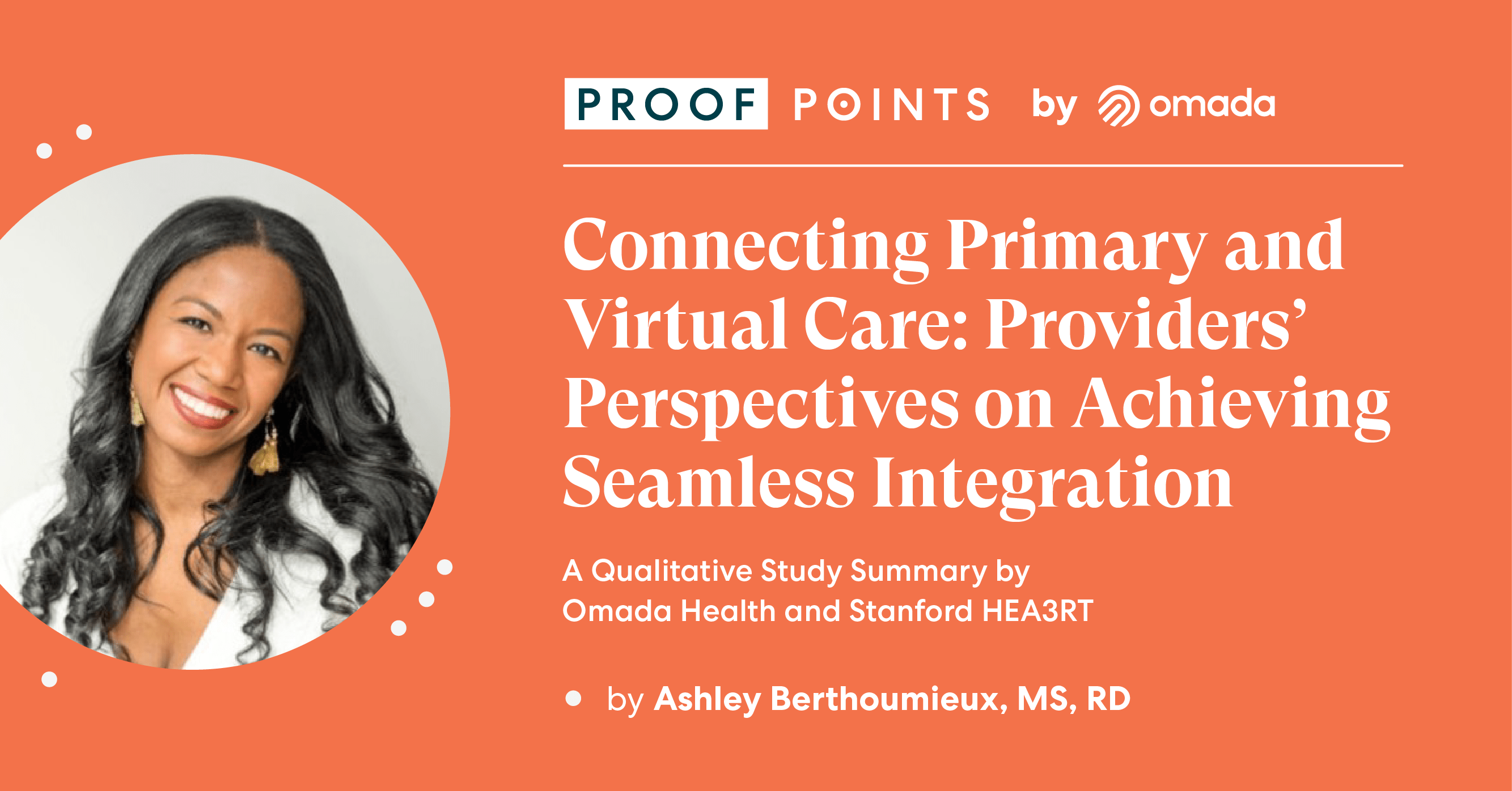All Resources
- For Health Plans
- For Employers
- For Benefit Consultant
- Case Studies
- Peer-Reviewed Studies
- Scientific Abstracts
- White Papers
- Articles
- Press Release
- Webinars & Events
- Videos
- Prevention & Weight Health
- Diabetes
- Hypertension
- MSK
- All conditions
- GLP-1s
- Clinical Research
- Product Innovation
- Thought Leadership
- Proof Points
Press Release
Omada Health Announces GLP-1 Prescribing Capability to Support Growing Member Population
11/06/2025

Scientific Abstracts
GLP-1 Medication Persistence Among Participants in a Virtual Weight Management Program
11/04/2025

Scientific Abstracts
Members in a Virtual Lifestyle Program Show Weight Maintenance 6-12 Months After Stopping A GLP-1
11/04/2025

Press Release
New Research from Omada Health Demonstrates Significant Cost Savings of Virtual Physical Therapy
08/28/2025

White Papers
PROMISE TO MAP | Omada's approach to build safety and security into AI-powered products
08/19/2025

Thought Leadership
What Everyone Should Know About Menopause and the Musculoskeletal System
05/22/2025

Thought Leadership
5 Key Lessons Learned in the U.S. about Weight Loss Drugs | Omada Health
05/02/2025

Scientific Abstracts
Lower Acute Healthcare Utilization Associated with Virtual Cardiometabolic Health Programs
05/01/2025

Press Release
Omada Health Extends Science of Behavior Change to Musculoskeletal Treatments Through Patented Compu
04/14/2025

Scientific Abstracts
Early Insights from a GLP-1 Focused Care Track within a Virtual Health Program
03/21/2025

Scientific Abstracts
The Impact of Providing Guided Choice in a Virtual Prevention Program
03/20/2025

Scientific Abstracts
Improvement in depression & anxiety symptoms among participants in a virtual cardiometabolic program
03/19/2025

Press Release
Omada Health Enhances Clinical Advisory Board to Further Advance Clinical Excellence
03/19/2025

Case Studies
Case Study: Advancing Health Equity in Government Programs with Omada and Sentara Health Plans
02/26/2025

Press Release
Doctors Report Concerns for Overprescribing & Continuity of Care for GLP-1s through Third-Parties
02/13/2025

White Papers
Connecting Primary and Virtual Care: Providers’ Perspectives on Achieving Seamless Integration
11/07/2024

Webinars & Events
The 28 Billion Dollar Reason Heart Health Matters in Women Post-menopause
10/28/2024

Press Release
Omada Health adds Sachin Jain, M.D., MBA, Julie Klapstein and Adam Stavisky to Board of Directors
08/01/2024

Thought Leadership
Avoiding Bias & Providing Culturally Relevant Dietary Advice | Omada Health
05/09/2024

Thought Leadership
How to Generate Meaningful Engagement in GLP-1 Programs | Omada Health
03/22/2024

Press Release
Research Shows Long-Term A1C Reduction & Sustained Weight Maintenance for Type 2 Diabetes Program
03/21/2024

Press Release
Omada Health Expands Insights Lab to Advance Industry Learnings on Long-Term Weight Health
02/26/2024

Webinars & Events
Inflation and Your Workforce: The Behavioral Impact of Financial Uncertainty
12/04/2023

Thought Leadership
Disparities in the Diabetes Journey for Women: A Call for Health Equity
10/23/2023

Thought Leadership
The Future of Virtual Care Delivery: Keeping Pace with Population Needs
10/20/2023

Peer-Reviewed Studies
Defying Stereotypes: Older Adults as High Engagers in App-Based Telehealth Physical Therapy
10/20/2023

Peer-Reviewed Studies
Long Term Results of a Digital Hypertension Self-Management Program
08/24/2023

Press Release
Omada Health Becomes the First Fully-Digital Company to Earn URAC Accreditation for Musculoskeletal
07/31/2023

Thought Leadership
How to Integrate Behavioral Health in Digital Health Programs | Omada Health
06/28/2023

Press Release
Omada Health Launches GLP-1-Specific Program for Patients Battling Chronic Obesity
05/24/2023
.jpg)
Thought Leadership
Determining the Success of Your Employee Wellness Program | Omada Health
05/15/2023

Thought Leadership
The Risky Business of Value-Based Care in Digital Health | Omada Health
03/14/2023

Webinars & Events
The State of the Virtual Care Industry: Results from a New Benchmark Survey from Omada Health, DiMe
01/19/2023

Press Release
Omada Health is the First Virtual Care Company to Join the Institute for Healthcare Improvement Lead
12/08/2022

Peer-Reviewed Studies
Impact of a Digitally Enhanced Diabetes Self-Management Program on Glycemia and Medical Costs
06/04/2022

Peer-Reviewed Studies
Pilot Results of a Digital Hypertension Self-management Program Among Adults With Excess Body Weight: Single-Arm Nonrandomized Trial
03/30/2022

Press Release
Omada Health Announces Integrated Behavioral Health Support Across Chronic Care Programs
03/09/2022

Peer-Reviewed Studies
Virtual Physical Therapy Program Delivers Significant Clinical Treatment Outcomes
02/24/2022

Peer-Reviewed Studies
How Virtual Physical Therapy Strengthens Patient Provider Relationships to Drive Meaningful Clinical
02/02/2022

Press Release
Omada Health Secures Preferred Status on Evernorth’s Digital Health Formulary for Diabetes, Hyperten
12/15/2021

Peer-Reviewed Studies
Early Insights From a Digitally Enhanced Diabetes Self-Management Education and Support Program
11/01/2021

Peer-Reviewed Studies
Costing a population health management approach for participant recruitment to a diabetes prevention
10/23/2021

Press Release
Omada Health Becomes First Fully-Virtual Healthcare Provider to Earn NCQA Population Health Program
05/25/2021

Peer-Reviewed Studies
Using a population health management approach to enroll participants in a diabetes prevention trial:
05/25/2021

Press Release
Omada Health Launches Physician-Guided Care Program, the First Virtual Cardiometabolic Clinic
04/14/2021

Peer-Reviewed Studies
Impact of a Digital Diabetes Prevention Program on Risk Factors for Chronic Disease in a Workforce Cohort
12/01/2020

Press Release
All Omada Health Chronic Care Programs Available on Evernorth Digital Health Formulary
11/12/2020

Press Release
Intermountain Healthcare Expands Omada’s Diabetes Prevention Program to At-Risk Patients
11/11/2020

Press Release
Omada Digital Diabetes Prevention Program Shows Sustained HbA1c Reduction and Weight Loss in Randomi
11/03/2020

Peer-Reviewed Studies
Cost Savings and Reduced Health Care Utilization Associated with Participation in a Digital Diabetes
08/18/2020

Peer-Reviewed Studies
Health Care Utilization and Medical Cost Outcomes from a Digital Diabetes Prevention Program in a Medicare
01/13/2020

Peer-Reviewed Studies
Evaluation of a Digital Diabetes Prevention Program Adapted for Low-Income Patients, 2016-2018
11/27/2019

Press Release
Blue Cross and Blue Shield of Minnesota Launches Omada’s Type 2 Diabetes Management Program
11/13/2019

Press Release
Abbott and Omada Health Partner to Offer Integrated Digital Health and Coaching Experience for Peopl
10/14/2019

Press Release
Omada Program Launches Preferred Devices to Monitor Blood Sugar, Blood Pressure
03/12/2019

Press Release
Priority Health First to Offer Omada Health Virtual Diabetes Prevention Tool to Michigan
10/03/2018

Peer-Reviewed Studies
Results From a Trial of an Online Diabetes Prevention Program Intervention
09/24/2018

Press Release
Cigna Expands Personalized Diabetes Prevention Program in Collaboration with Omada Health
09/18/2018

Press Release
Cigna Announces Cigna Ventures with $250 Million to Fund Transformative Innovation and Growth for He
09/12/2018

Press Release
Omada Health Adds New Programs for Type 2 Diabetes and Hypertension Self-Management
06/20/2018

Peer-Reviewed Studies
Evaluation of a digital diabetes prevention program adapted for the Medicaid population: Study design
05/06/2018

Peer-Reviewed Studies
Engagement and outcomes in a digital Diabetes Prevention Program: 3-year update
09/07/2017

Peer-Reviewed Studies
Evaluation of a Digital Behavioral Counseling Program for Reducing Risk Factors for Chronic Disease
08/01/2017

Peer-Reviewed Studies
Adaptation and Feasibility Study of a Digital Health Program to Prevent Diabetes among Low-Income Patients
10/27/2016

Peer-Reviewed Studies
Clinical and Economic Impact of a Digital Intensive Behavioral Counseling on Medicare Beneficiaries
10/05/2016

Press Release
AMA, Omada Health, Intermountain Healthcare Partner to Reduce Incidence of Type 2 Diabetes
07/26/2016

Peer-Reviewed Studies
Return on Investment for Digital Behavioral Counseling in Patients With Prediabetes and Cardiovascul
01/28/2016

Press Release
Omada Health and Humana Partner to Reduce Diabetes Risk in People with Medicare
11/13/2015

Peer-Reviewed Studies
Women veteran's experience with a web-based diabetes prevention program
05/15/2015

Peer-Reviewed Studies
Long-term outcomes of a Web-based diabetes prevention program: 2-year results of a single-arm longitudinal study
04/10/2015

Press Release
CDC Recognizes Omada Health’s Prevent for Use in Its Diabetes Prevention Program
03/05/2015

Peer-Reviewed Studies
Translating the Diabetes Prevention Program into an Online Social Network
04/10/2014












.png)



































































.jpg)


























-1.png)




















































